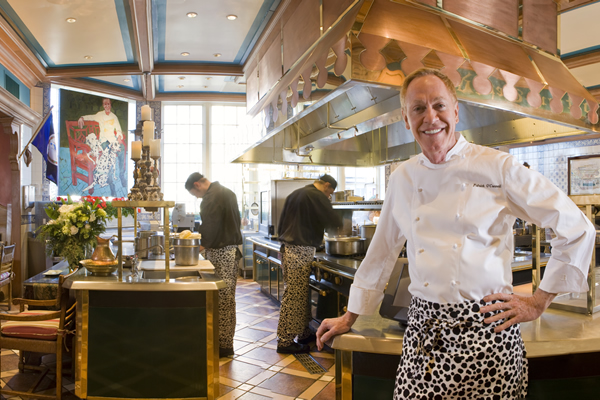a&e features
Chef Patrick O’Connell offers lavish wedding prize
HRC to auction dream ceremony at Inn at Little Washington
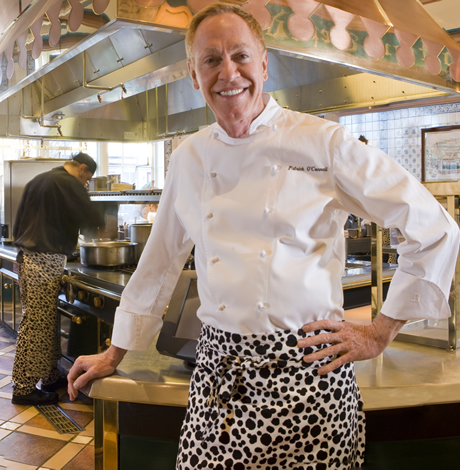
Fourth annual Chefs for Equality
Human Rights Campaign
Tuesday, Oct. 20
6-9:30 p.m.
Ritz-Carlton
‘ReFRAin from Discrimination’
Tickets: $200
The Inn at Little Washington
309 Middle St.
Washington, VA
The Inn at Little Washington is a bit like the Meryl Streep of its domain: not wholly impervious to the occasional ranking slippage or so-so review, yet possessing so many across-the-board top awards and five-star raves, its reputation is beyond impeccable.
Top rankings from the 2015 Forbes Travel Guide, the American Automobile Association, Travel+Leisure and Le Chef Magazine, rave reviews from the Washington Post and D.C. Modern Luxury and a grand award from Wine Spectator (for the 21st consecutive year) are just the recent accolades. The coffee table book “The Inn at Little Washington: a Magnificent Obsession” made the New York Times bestseller list for “fashion, manners and customs” in May and offers sumptuous photos of the Inn’s lavish and gilded interiors.
Owned by chef/proprietor Patrick O’Connell, unofficially dubbed the “pope of American cuisine,” the Inn is in Washington, Va., located 67 miles southwest of Washington, D.C., in the foothills of the Blue Ridge Mountains. It has 24 guest rooms, an 80-seat restaurant that has earned many top reviews from the most prestigious publications and a 13,000-bottle wine cellar. The Inn is open year round every night except Tuesday.
This year O’Connell is again participating in the Human Rights Campaign’s annual Chefs for Equality event on Tuesday, Oct. 20. But this year, for the first time, he’s offering an auction item in which attendees can win an all-inclusive wedding package including dinner for 14 at the Inn with O’Connell himself officiating.
Over tea one sunny and quite warm afternoon in early September, O’Connell spent an hour reflecting on his career, the price of being out and how he has maintained the Inn’s reputation over the decades. His comments have been slightly edited for length.
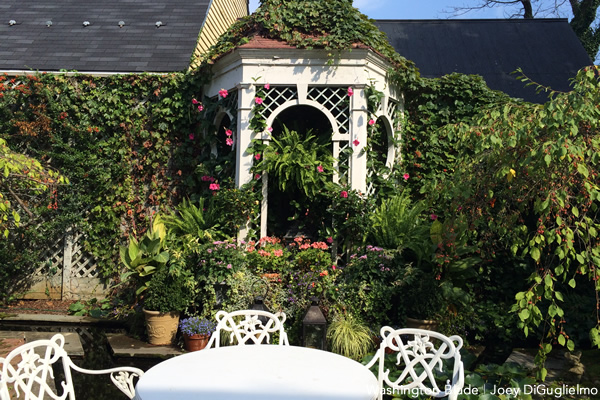
A gazebo and outdoor dining just off the main dining room at the Inn at Little Washington. (Washington Blade photo by Joey DiGuglielmo)
WASHINGTON BLADE: You became ordained just to offer this wedding package?
PATRICK O’CONNELL: I am not officially ordained at this time but my idea was that we could create a singular one-of-a-kind opportunity and offer it for the benefit of HRC that would be very hard to put a dollar value on. We thought it would be kind of fun and novel at the same time. We had begun to do some same-gender weddings — I always say same-gender rather than same-s-e-x weddings because I think for the public at large, that’s a far more appropriate term. I think if we had used that language rather than using s-e-x, we would have come along much further, much faster.
BLADE: Why?
O’CONNELL: It’s a loaded word. What’s the first thing you think of when you think of sex? The act, right? I think it was referred to as such by our detractors knowing that it would have charged, negative significance. But gender is gender. It’s uncharged. So I guess we had the first same-gender wedding in Rappahannock County at the Inn and we managed to discover that there was a judge who was not only open to do it, but was also a tribal member and it was delightful in every way. That was about two years ago. Then we had a few others. … I realized it was not a complex matter to be an officiant — I never intended to enter the ministry, although I do a lot of ministering just in my role as an employer. But in general I shy away from labels because I think they are limiting and work against people and can be very damaging. They always reduce an idea or a concept into one word and that’s kind of silly.
BLADE: But don’t we need them on some practical level?
O’CONNELL: Well, no question. It helps. But I think we’re all more than one word and capable of being many things. … I rather like the term healer, which encompasses nourishing and nurturing people. Looking after their well being. Ministering to them, et cetera.
BLADE: Did being out (O’Connell founded the Inn with his former partner whom he eventually bought out) ever hurt you?
O’CONNELL: Oh, it almost had me murdered on numerous occasions. Yes, the hostility was venomous. There was a small contingent of locals who were feeling very much that something extremely foreign was happening in their midst when we started. They were unable to understand what we were about and then the fact that the business took off immediately and became successful started bringing in what were to them outsiders. There are people who felt they belonged here because they were born here and then there are outsiders who are an unproven entity. And of course you have to think the worst because they’re untested. When you have a track record, when you’ve been some place for three generations, then you’re predictable.
BLADE: Isn’t it funny, though, when one of their own comes out?
O’CONNELL: Isn’t that the truth? Or you see how they try to integrate it or reconcile it. Or overlook it.
BLADE: How did the Chefs for Equality package come about?
O’CONNELL: We’ve always tried to be supportive (of HRC) and we wanted people of all genders to know that it was possible to have a marriage celebration here and that it is possible to be married here so we thought it would be wonderful to create a fantasy wedding and take care of all the details leaving the couple no worries of a financial sort or whether it would come off. A lot of the stress of a wedding is budget. How much up front? How much will this or that cost? … This takes all that away so all you have to do is come here and get married.
BLADE: How many gay weddings have you had here?
O’CONNELL: I think probably four or five. Some quite small. The biggest was probably 50 seated guests. Here it usually involves dinner and this one will as well. Although this is not limited by gender. Opposite-gender couples can bid on this item as well. We’re wide open.
BLADE: Will you continue to officiate at weddings here or is this a one-off?
O’CONNELL: Initially the idea was that I would make it available only once. We have a minister on staff who has done about 170 weddings here over 15 years. … He hasn’t performed same-gender yet but he’s open to that. … I’ve witnessed many of his ceremonies and it’s always charming when you have someone who’s rooted in the place where you are married and is comfortable there, not just somebody who walks in and has never been here before. I think it’s a nice touch to have the chef and owner of the property offer to do this and it would be a once-in-a-lifetime kind of situation. So therefore it certainly potentially adds value to the auction item.
BLADE: Has the Inn always had an LGBT clientele?
O’CONNELL: Always, yes yes yes. And probably more and more each year.
BLADE: Are gays harder to please?
O’CONNELL: Certainly not with weddings. Overall I think they’re among our most appreciative audience because they’re knowledgeable and focused on details and very responsive to the ambience. What’s a little strange for them sometimes is to be outside an urban environment altogether and so we take care to be sure that they’re completely comfortable here. We’re part of a European-based association called Relais & Chateaux and we have member properties in 52 nations so through that we see a lot of European guests. It’s a very nice thing to hear different languages being spoken in the dining room on a given night and to have this sense that you’ve escaped Washington (D.C.) in a way. We like to think of ourselves as a little foreign embassy out here. It’s out in nowhere land and sometimes you can lose a little of your baggage out here. … You feel much further from Washington than you actually are. … It has a good healing energy and I think people feel restored when they come here.
BLADE: Nobody can go 100 miles per hour all the time. How do you maintain such a high level over many years and not get burned out?
O’CONNELL: It’s complicated but also in a way very simple. Each day you have to find something that you can do better than you did the day before so you have some tangible sense of improvement and evolution and it becomes ingrained in your culture. The Inn has never stopped. It has continued to evolve since it was a garage. Almost every day we’ve succeeded in making some improvement. If we were to look back at a film of what we were like 10, 15, 20,25, 30 years ago, it would laughable for most people compared to where we are today… It’s performance art and you have to fine-tune it all the time and you have to be incredibly self critical. That’s what’s hard for people. No one likes to be brutally self critical, so we joke about it. We say things like, “We look like we almost know what we’re doing. One day we’ll have this down.” Basically we’re just real people but ordinary people trying collectively to do something extraordinary. As long as everyone subscribes to that theory, then that’s what’s called for and the only thing that’s going to work.
BLADE: How do you convey your vision to the staff?
O’CONNELL: You have to find ways to continue to energize your team, to continue to challenge them and give them something to dream about so you’re inspiring them all the time to not only do their best but, like a trainer might in a gym, if he can succeed in getting his client more than they can do on their own, then he’s providing value. It’s just like with any sport — swimming for instance, you want to shorten your time on a sprint or something like that. … I love hearing them when they come back and they’ve had these breakthroughs. Some of them are quite young but they realize that the progress they’re making here translates into anything else they do in life. I love it when a former staff person will come back and maybe they’re a successful lawyer in Washington or New York and they come back and say the reason my career took off the way it did its what I learned here, how I learned to read people, to intuit people, to think on my feet and be able to do five things at one time. My feeling is there should be a point in every young person’s life when they benefit from working in a restaurant. Not only do you get an appreciation for how hard it is — it is not easy work, it’s extremely taxing mentally and physically — but to be able to subtly control an audience while creating the illusion that the audience is controlling you, is fascinating.
BLADE: How many are on staff?
O’CONNELL: 140
BLADE: How much of the cooking do you actually do?
O’CONNELL: I’m in the kitchen every night and generally I’m in a position where I can watch from one vantage point what everyone is doing, like an orchestra conductor. They’re facing me and I’m facing them and there are no hiding places. You develop a sixth sense and you can feel when everything is on and when it’s going to be a good night.
BLADE: And when things go wrong?
O’CONNELL: With 140 people, there’s some sort of a personal crisis every day so you have to be sure they’re OK and see how it’s affecting the entire team. … You have to get all that out of the way or it’s going to have a negative impact. … Humor is my greatest tool and weapon. In the kitchen we can be as naughty and outrageous as we want to be. … It’s about not taking ourselves overly seriously. We can have a little fun but not lose focus.
BLADE: If you’re Robert De Niro, you can go back and watch “Raging Bull” if you want, or whatever. Food, though, is ephemeral. What kind of legacy can you build in an ephemeral medium?
O’CONNELL: I think sometimes the most beautiful things are the ephemeral ones. Those that can’t really be put into words or saved with a snapshot. I stopped taking pictures ages ago simply because they were never as good as reality. And there was never time to look at them. Rarely did I find one that did justice to the moment. Very often you’ll be reminded of an important occasion. You’ll hear that an experience was very important to a guest and maybe they’ll be on their deathbed reminiscing and they’ll have had an occasion here that was unforgettable. That’s very sweet, really, really nice. What more do you need? It’s why live theater has greater value than film. You can watch a concert on television but why is it that people when they sit there in an auditorium and listen to an entertainer sing, they feel ripped off when they’re lip syncing? Because it’s just not the same, it’s not in the moment. That’s what we offer and I really do believe that you reach people either consciously or unconsciously. Even if they don’t get all the details, they can feel them.
BLADE: Do the accolades bring with them a burden as well? The public comes with much higher expectations when they hear of all the accolades and ratings.
O’CONNELL: The staff always joked that I made the lies true. Early on I got a call from Craig Claiborne, he was the New York Times food writer, and he said, “Did you hear the news, the Zagat survey came out and you’re number one in America.” I said, “Yeah.” He said, “the number one resort.” This was shortly after we converted the garage. We never thought of ourselves as a resort. We had no amenities whatsoever. My first thought was that it must have been an error. Then I thought, “God, what am I gonna do?” So the next day I went out and bought two bicycles and that’s where that little slogan came from. You make the lies true. The next year they changed the category for inns and we were number one for inns so it was a little more appropriate. But yes, each of them heightens expectations and it’s hard to get that across to the staff. One food writer once said she would hate it if she were running a place and it was called the best in the world because then the simplest flaw that would not even be noticed or observed in a lesser restaurant would stand out in neon and that’s all anybody would remember. So in that regard, the clientele is less forgiving than they would be almost anywhere else and the expectations are greater, but in the end it’s always about how we make them feel. If we focus on that, on knowing each person is different and has to be reached, then it’s not overwhelming.
BLADE: Has it benefitted you in the long run being rather isolated out here?
O’CONNELL: I think you see from studying other restaurants you do see chefs and proprietors buckle under the pressure of being held up on this incredible pedestal. Because of course the media typically plays the game of putting them up there and then shooting them off. So we’ve been fortunate in that we’re like an old tree that grew year by year by year. We didn’t just open the doors and skyrocket because what happens very often in those situations is they get locked in and they’re so busy that all they can do is maintain. Being here in the country, we usually have a quiet few weeks in the winter, weekends are the same, but we have some very quiet weeknights that can be these wonderful opportunities to regroup and plan and strategize and reinvent ourselves. Also living out here has created a balance. We don’t go discoing after work like we might if we were in the city. You take a walk, you walk the dog if you have one, you look at the moon. You take a few deep breaths. You might read a little. You learn to hate television. Then you have a pretty good night’s sleep listening to the crickets. I think it helps create longevity and it’s a fabulous antidote to the incredible intensity that goes on here. On a Saturday night when you might have two critics and a head of state and the pressure is just sort of throbbing, you can step out and it feels like it was just an illusion. I used to step out sometimes, my head would be spinning, and I’d look across at the neighbors and they’re porch sitting and you think, “Who has the better life?” But then you remind yourself not to get unbalanced by the intensity. It comes in a wave, then it dissipates.
BLADE: Do you get millennials here?
O’CONNELL: Yes. They come in the kitchen and say hi. And I say, “First time?” They say, “Yes, how’d you know?” “Because you’re so young!” They say their parents have been coming for a long time and that’s very sweet to hear. Not long ago a man came to propose and said he’d been coming here since he was 5. That was really sweet.
BLADE: Society overall has gotten so informal. People go everywhere looking like slobs. Do you see it here?
O’CONNELL: It is changing very perceptively. We used to have a sort of image of our client in our minds because that was the majority. A very well-coiffed woman in a Chanel suit who was extremely well traveled and mentored and schooled in social etiquette by somebody and it’s very different now. Then we had the computer generation and we had people showing up wearing tennis shoes without laces and you thought, “Well maybe they’ve had a foot operation,” but no. It was the idea of, “I’m a success in the computer world, in the IT world, why would I make any effort.” So that was all fine. We’ve always joked when asked if we had a dress code, we say, “Yes — no wet bikinis.” Sometimes you see Armani out in the finest restaurants in Europe and he wears just a black T-shirt. And he’s probably the richest man ever to walk in the place. The Italian and French idea is that you shouldn’t have anything imposed on you. It’s your personality and who you are and that’s acceptable. If you’re here, then you’re supposed to be here. You might be eccentric, you might be odd as hell, you might look like a banshee, but if you’re here then you’re somebody. … But it is a shame that so much of the culture is being lost as it’s being relaxed and supplanted by something else.
BLADE: What’s the last great meal you had in D.C.?
O’CONNELL: It isn’t quite that simple. It’s about what fit my mood perfectly at that moment and who I might have been with. It’s hard when you’re in the biz to turn off your critical faculty. It’s nice to take a poor friend or a 9-year-old child or someone for whom anything is going to be, “Wow, this is really fun,” because then you see it through their eyes. I dine out alone a lot and am quite comfortable doing that.
BLADE: Are you often recognized?
O’CONNELL: Often and that can be delightful except that you often end up eating more than you wanted to eat because you’re sent a little taste of this and that as a courtesy so it becomes a diplomatic occasion and something that has another element to it. It’s fine if you’re in the mood for it like if it’s your birthday or something it’s OK, but if you just stopped in because you had low blood sugar and you couldn’t make it any further, then you have to be on and it’s your night off, so it can be tricky. But I’m very appreciative of the effort anyone makes who’s in this business because I know how hard it is.
BLADE: There’s a lot of back and forth about following one’s passions versus pursuing more practical career paths. As someone who’s done the former, what are your thoughts?
O’CONNELL: Culturally we have a very simple problem. America has led the way in attempting to convince people that there is only one goal and only one game and that is money. The minute you can free yourself of that and realize that that can greatly limit you and that there are many other sources of measuring achievement and success, then you’re open to pursue more of something from within and a direction that’s more true to yourself. My feeling has always been if you do what you love and find out what you love and work toward mastery, everything else will fall into place. You’re not going to have to worry about money, but mastery is something that requires a great deal of sacrifice and commitment and most people simply aren’t willing to make the sacrifice and the degree of commitment required. … There are ways to turn your liabilities into assets.
BLADE: Such as?
O’CONNELL: You look at a gay person who grows up and the first thing they have to do in my generation is disguise so they don’t get beaten or killed. Or at least hated and scorned and whatever. It was automatic. So that terrible adaptation is also a tremendous strength. You want me to play this? OK, I can play this. You master acting right off the bat. You had lemons and you made lemonade and you did what you could but you ultimately benefitted from it.
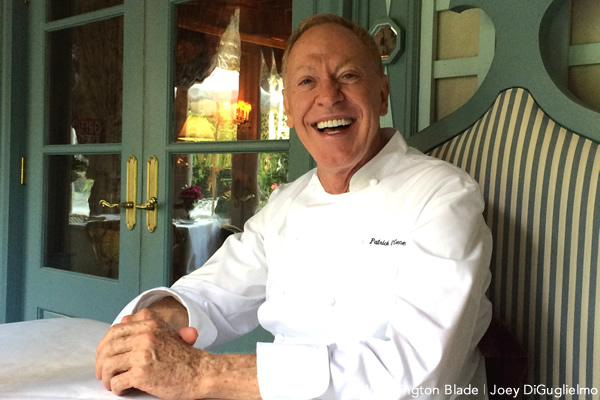
Patrick O’Connell says slow growth over many years helped the Inn cement its stellar reputation. (Washington Blade photo by Joey DiGuglielmo)
a&e features
Eastern Shore chef named James Beard Finalist
Harley Peet creates inventive food in an inclusive space

In a small Eastern Shore town filled with boutiques, galleries, and the occasional cry of waterfowl from the Chesapeake, Chef Harley Peet is most at home. In his Viennese-inflected, Maryland-sourced fine-dining destination Bas Rouge, Peet draws from his Northern Michigan upbringing, Culinary Institute of America education, and identity as a gay man, for inspiration.
And recently, Peet was named a James Beard Finalist for Best Chef: Mid-Atlantic – the first “Best Chef: Mid-Atlantic” finalist representing the Eastern Shore.
Peet, after graduation from the Culinary Institute of America, took a position as sous chef at Tilghman Island Inn, not far from Bas Rouge. Falling in love with the Eastern Shore, he continued his passion for racing sailboats, boating, gardening, and fishing, and living his somewhat pastoral life as he opened Bas Rouge in 2016 as head chef, a restaurant part of the Bluepoint Hospitality group, which runs more than a dozen concepts in and around Easton, Md.
Coming from a rural area and being gay, Peet knew he had his work cut out for him. He was always aware that the service and hospitality industry “can be down and dirty and rough.”
Now as a leader in the kitchen, he aims to “set a good example, and treat people how I want to be treated. I also want to make sure if you’re at our establishment, I’m the first to stand up and say something.”
The Bas Rouge cuisine, he says, is Contemporary European. “I’m inspired by old-world techniques of countries like Austria, Germany, and France, but I love putting a new spin on classic dishes and finding innovative ways to incorporate the bounty of local Chesapeake ingredients.”
His proudest dish: the humble-yet-elevated Wiener Schnitzel. “It is authentic to what one would expect to find in Vienna, down to the Lingonberries.” From his in-house bakery, Peet dries and grinds the housemade Kaiser-Semmel bread to use as the breadcrumbs.
Peet works to support the LGBTQ community inside and outside of the kitchen. “I love that our Bluepoint Hospitality team has created welcoming spaces where our patrons feel comfortable dining at each of our establishments. Our staff have a genuine respect for one another and work together free of judgment.”
Representing Bluepoint, Peet has participated in events like Chefs for Equality with the Human Rights Campaign, advocating for LGBTQ rights.
At Bas Rouge, Peet brings together his passion for inclusion steeped in a sustainability ethic. He sees environmental stewardship as a way of life. Peet and his husband have lived and worked on their own organic farm for several years. Through research in Europe, he learned about international marine sourcing. Witnessing the impacts of overfishing, Peet considers his own role in promoting eco-friendly practices at Bas Rouge. To that end, he ensures responsible sourcing commitments through his purveyors, relationships that have helped create significant change in how people dine in Easton.
“I have built great relationships in the community and there’s nothing better than one of our long-standing purveyors stopping in with a cooler of fresh fish from the Chesapeake Bay. This goes especially for catching and plating the invasive blue catfish species, which helps control the species’ threat to the local ecosystem.
Through his kitchen exploits, Peet expressed a unique connection to another gay icon in a rural fine-dining restaurant: Patrick O’Connell, of three Michelin starred Inn at Little Washington. In fact, Peet’s husband helped design some of O’Connell’s kitchen spaces. They’ve both been able to navigate treacherous restaurant-industry waters, and have come out triumphant and celebrated. Of O’Connell, Peet says that he “sees [his restaurants] as canvas, all artistry, he sees this as every night is a show.” But at the same time, his “judgment-free space makes him a role model.”
Being in Easton itself is not without challenges. Sourcing is a challenge, having to either fly or ship in ingredients, whereas urban restaurants have the benefit of trucking, he says. The small town “is romantic and charming,” but logistics are difficult – one of the reasons that Peet ensures his team is diverse, building in different viewpoints, and also “making things a hell of a lot more fun.”
Reflecting on challenges and finding (and creating) space on the Eastern Shore, Peet confirmed how important it was to surround himself with people who set a good example, and “if you don’t like the way something is going … move on.”
a&e features
What to expect at the 2024 National Cannabis Festival
Wu-Tang Clan to perform; policy discussions also planned

(Editor’s note: Tickets are still available for the National Cannabis Festival, with prices starting at $55 for one-day general admission on Friday through $190 for a two-day pass with early-entry access. The Washington Blade, one of the event’s sponsors, will host a LGBTQIA+ Lounge and moderate a panel discussion on Saturday with the Mayor’s Office of LGBTQ Affairs.)
With two full days of events and programs along with performances by Wu-Tang Clan, Redman, and Thundercat, the 2024 National Cannabis Festival will be bigger than ever this year.
Leading up to the festivities on Friday and Saturday at Washington, D.C.’s RFK Stadium are plenty of can’t-miss experiences planned for 420 Week, including the National Cannabis Policy Summit and an LGBTQ happy hour hosted by the District’s Black-owned queer bar, Thurst Lounge (both happening on Wednesday).
On Tuesday, the Blade caught up with NCF Founder and Executive Producer Caroline Phillips, principal at The High Street PR & Events, for a discussion about the event’s history and the pivotal political moment for cannabis legalization and drug policy reform both locally and nationally. Phillips also shared her thoughts about the role of LGBTQ activists in these movements and the through-line connecting issues of freedom and bodily autonomy.
After D.C. residents voted to approve Initiative 71 in the fall of 2014, she said, adults were permitted to share cannabis and grow the plant at home, while possession was decriminalized with the hope and expectation that fewer people would be incarcerated.
“When that happened, there was also an influx of really high-priced conferences that promised to connect people to big business opportunities so they could make millions in what they were calling the ‘green rush,'” Phillips said.
“At the time, I was working for Human Rights First,” a nonprofit that was, and is, engaged in “a lot of issues to do with world refugees and immigration in the United States” — so, “it was really interesting to me to see the overlap between drug policy reform and some of these other issues that I was working on,” Phillips said.
“And then it rubbed me a little bit the wrong way to hear about the ‘green rush’ before we’d heard about criminal justice reform around cannabis and before we’d heard about people being let out of jail for cannabis offenses.”
“As my interests grew, I realized that there was really a need for this conversation to happen in a larger way that allowed the larger community, the broader community, to learn about not just cannabis legalization, but to understand how it connects to our criminal justice system, to understand how it can really stimulate and benefit our economy, and to understand how it can become a wellness tool for so many people,” Phillips said.
“On top of all of that, as a minority in the cannabis space, it was important to me that this event and my work in the cannabis industry really amplified how we could create space for Black and Brown people to be stakeholders in this economy in a meaningful way.”

“Since I was already working in event production, I decided to use those skills and apply them to creating a cannabis event,” she said. “And in order to create an event that I thought could really give back to our community with ticket prices low enough for people to actually be able to attend, I thought a large-scale event would be good — and thus was born the cannabis festival.”
D.C. to see more regulated cannabis businesses ‘very soon’
Phillips said she believes decriminalization in D.C. has decreased the number of cannabis-related arrests in the city, but she noted arrests have, nevertheless, continued to disproportionately impact Black and Brown people.
“We’re at a really interesting crossroads for our city and for our cannabis community,” she said. In the eight years since Initiative 71 was passed, “We’ve had our licensed regulated cannabis dispensaries and cultivators who’ve been existing in a very red tape-heavy environment, a very tax heavy environment, and then we have the unregulated cannabis cultivators and cannabis dispensaries in the city” who operate via a “loophole” in the law “that allows the sharing of cannabis between adults who are over the age of 21.”
Many of the purveyors in the latter group, Phillips said, “are looking at trying to get into the legal space; so they’re trying to become regulated businesses in Washington, D.C.”
She noted the city will be “releasing 30 or so licenses in the next couple of weeks, and those stores should be coming online very soon” which will mean “you’ll be seeing a lot more of the regulated stores popping up in neighborhoods and hopefully a lot more opportunity for folks that are interested in leaving the unregulated space to be able to join the regulated marketplace.”
National push for de-scheduling cannabis
Signaling the political momentum for reforming cannabis and criminal justice laws, Wednesday’s Policy Summit will feature U.S. Sens. Raphael Warnock (D-Ga.), Jeff Merkley (D-Ore.), Elizabeth Warren (D-Mass.), and Chuck Schumer (D-N.Y.), the Senate majority leader.
Also representing Capitol Hill at the Summit will be U.S. Congresswoman Eleanor Holmes Norton (D-D.C.) and U.S. Reps. Earl Blumenauer (D-Ore.) and Barbara Lee (D-Calif.) — who will be receiving the Supernova Women Cannabis Champion Lifetime Achievement Award — along with an aide to U.S. Rep. David Joyce (R-Ohio).
Nationally, Phillips said much of the conversation around cannabis concerns de-scheduling. Even though 40 states and D.C. have legalized the drug for recreational and/or medical use, marijuana has been classified as a Schedule I substance since the Controlled Substances Act was passed in 1971, which means it carries the heftiest restrictions on, and penalties for, its possession, sale, distribution, and cultivation.
The U.S. Department of Health and Human Services formally requested the drug be reclassified as a Schedule III substance in August, which inaugurated an ongoing review, and in January a group of 12 Senate Democrats sent a letter to the Biden-Harris administration’s Drug Enforcement Administration urging the agency to de-schedule cannabis altogether.
Along with the Summit, Phillips noted that “a large contingent of advocates will be coming to Washington, D.C. this week to host a vigil at the White House and to be at the festival educating people” about these issues. She said NCF is working with the 420 Unity Coalition to push Congress and the Biden-Harris administration to “move straight to de-scheduling cannabis.”
“This would allow folks who have been locked up for cannabis offenses the chance to be released,” she said. “It would also allow medical patients greater access. It would also allow business owners the chance to exist without the specter of the federal government coming in and telling them what they’re doing is wrong and that they’re criminals.”
Phillips added, however, that de-scheduling cannabis will not “suddenly erase” the “generations and generations of systemic racism” in America’s financial institutions, business marketplace, and criminal justice system, nor the consequences that has wrought on Black and Brown communities.
An example of the work that remains, she said, is making sure “that all people are treated fairly by financial institutions so that they can get the funding for their businesses” to, hopefully, create not just another industry, but “really a better industry” that from the outset is focused on “equity” and “access.”
Policy wonks should be sure to visit the festival, too. “We have a really terrific lineup in our policy pavilion,” Phillips said. “A lot of our heavy hitters from our advocacy committee will be presenting programming.”
“On Saturday there is a really strong federal marijuana reform panel that is being led by Maritza Perez Medina from the Drug Policy Alliance,” she said. “So that’s going to be a terrific discussion” that will also feature “representation from the Veterans Cannabis Coalition.”
“We also have a really interesting talk being led by the Law Enforcement Action Partnership about conservatives, cops, and cannabis,” Phillips added.
Cannabis and the LGBTQ community
“I think what’s so interesting about LGBTQIA+ culture and the cannabis community are the parallels that we’ve seen in the movements towards legalization,” Phillips said.
The fight for LGBTQ rights over the years has often involved centering personal stories and personal experiences, she said. “And that really, I think, began to resonate, the more that we talked about it openly in society; the more it was something that we started to see on television; the more it became a topic in youth development and making sure that we’re raising healthy children.”
Likewise, Phillips said, “we’ve seen cannabis become more of a conversation in mainstream culture. We’ve heard the stories of people who’ve had veterans in their families that have used cannabis instead of pharmaceuticals, the friends or family members who’ve had cancer that have turned to CBD or THC so they could sleep, so they could eat so they could get some level of relief.”
Stories about cannabis have also included accounts of folks who were “arrested when they were young” or “the family member who’s still locked up,” she said, just as stories about LGBTQ people have often involved unjust and unnecessary suffering.
Not only are there similarities in the socio-political struggles, Phillips said, but LGBTQ people have played a central role pushing for cannabis legalization and, in fact, in ushering in the movement by “advocating for HIV patients in California to be able to access cannabis’s medicine.”
As a result of the queer community’s involvement, she said, “the foundation of cannabis legalization is truly patient access and criminal justice reform.”
“LGBTQIA+ advocates and cannabis advocates have managed to rein in support of the majority of Americans for the issues that they find important,” Phillips said, even if, unfortunately, other movements for bodily autonomy like those concerning issues of reproductive justice “don’t see that same support.”
a&e features
Juliet Hawkins’s music defies conventional categorization
‘Keep an open mind, an open heart, and a willingness to evolve’
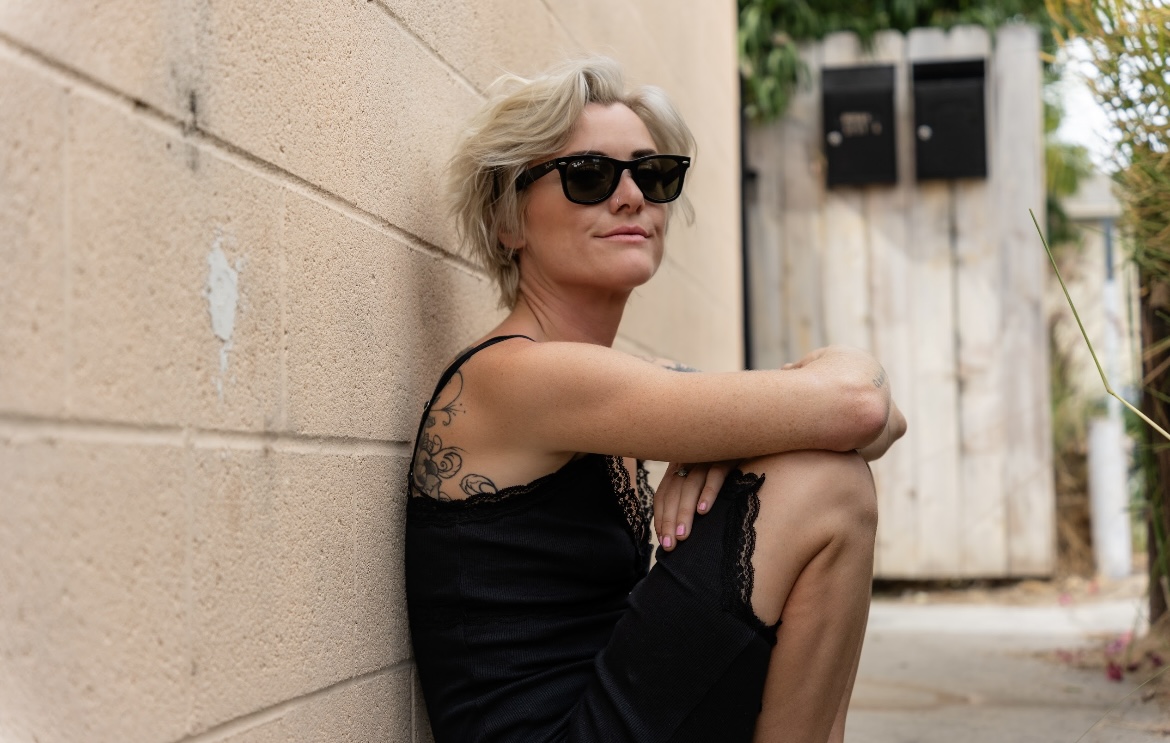
LONG BEACH, Calif. – Emerging from the dynamic music scene of Los Angeles, Juliet Hawkins seamlessly integrates deeply soulful vocals with contemporary production techniques, crafting a distinctive sound that defies conventional categorization.
Drawing inspiration from the emotive depth of Amy Winehouse and weaving together elements of country, blues, and pop, Hawkins’ music can best be described as a fusion–perhaps best termed as soulful electronica. Yet, even this characterization falls short, as Hawkins defines herself as “a blend of a million different inspirations.”
Hawkins’s musical palette mirrors her personae: versatile and eclectic. Any conversation with Hawkins makes this point abundantly clear. She exhibits the archetype of a wild, musical genius while remaining true to her nature-loving, creative spirit. Whether recording in the studio for an album release, performing live in a studio setting, or playing in front of a live audience, Hawkins delivers her music with natural grace.
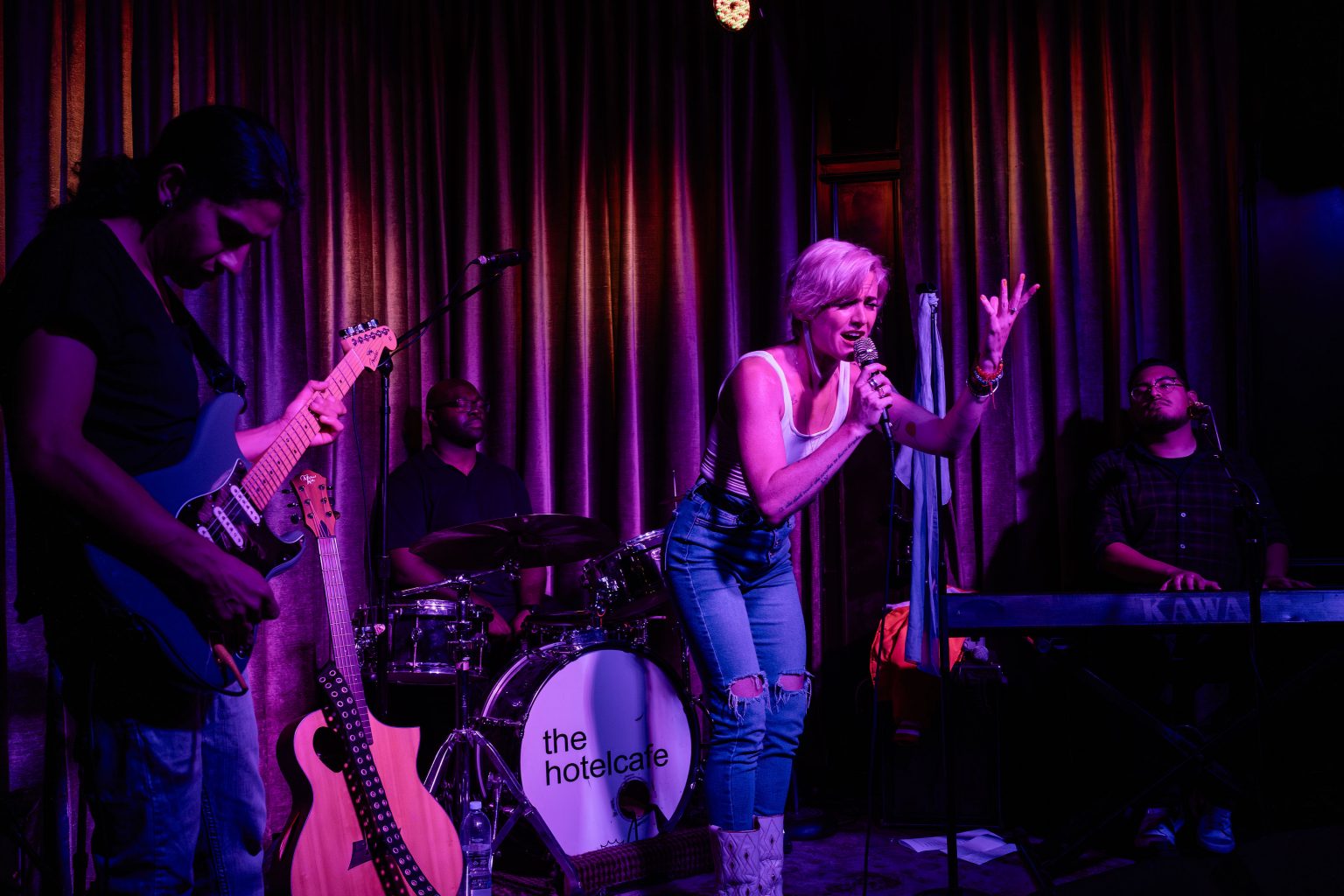
However, Hawkins’s musical journey is far from effortless. Amid personal challenges and adversity, she weaves her personal odyssey of pain and pleasure, transforming these experiences into empowering anthems.
In a candid interview with the Blade, Hawkins spoke with profound openness and vulnerability about her past struggles with opiate and heroin addiction: “That was 10 years ago that I struggled with opiates,” she shared. Yet, instead of letting her previous addiction define her, Hawkins expressed to the Blade that she harbors no shame about her past. “My newer music is much more about empowerment than recovery,” she explained, emphasizing that “writing was the best way to process trauma.”
Despite her struggles with addiction, Hawkins managed to recover. However, she emphasizes that this recovery is deeply intertwined with her spiritual connection to nature. An illustrative instance of Hawkins’ engagement with nature occurred during the COVID pandemic.
Following an impulse that many of us have entertained, she bought a van and chose to live amidst the trees. It was during this period that Hawkins composed the music for her second EP, titled “Lead with Love.”
In many ways, Hawkins deep spiritual connection to nature has been profoundly shaped by her extensive travels. Born in San Diego, spending her formative years in Massachusetts, and later moving to Tennessee before returning to Southern California, she has broadened her interests and exposed herself to the diverse musical landscapes across America.
“Music is the only thing I have left,” Hawkins confides to the Blade, highlighting the integral role that music has in her life. This intimate relationship with music is evident in her sultry and dynamic compositions. Rather than imitating or copying other artists, Hawkins effortlessly integrates sounds from some of her favorite musical influences to create something new. Some of these influences include LP, Lucinda Williams, Lana Del Rey, and, of course, Amy Winehouse, among others.
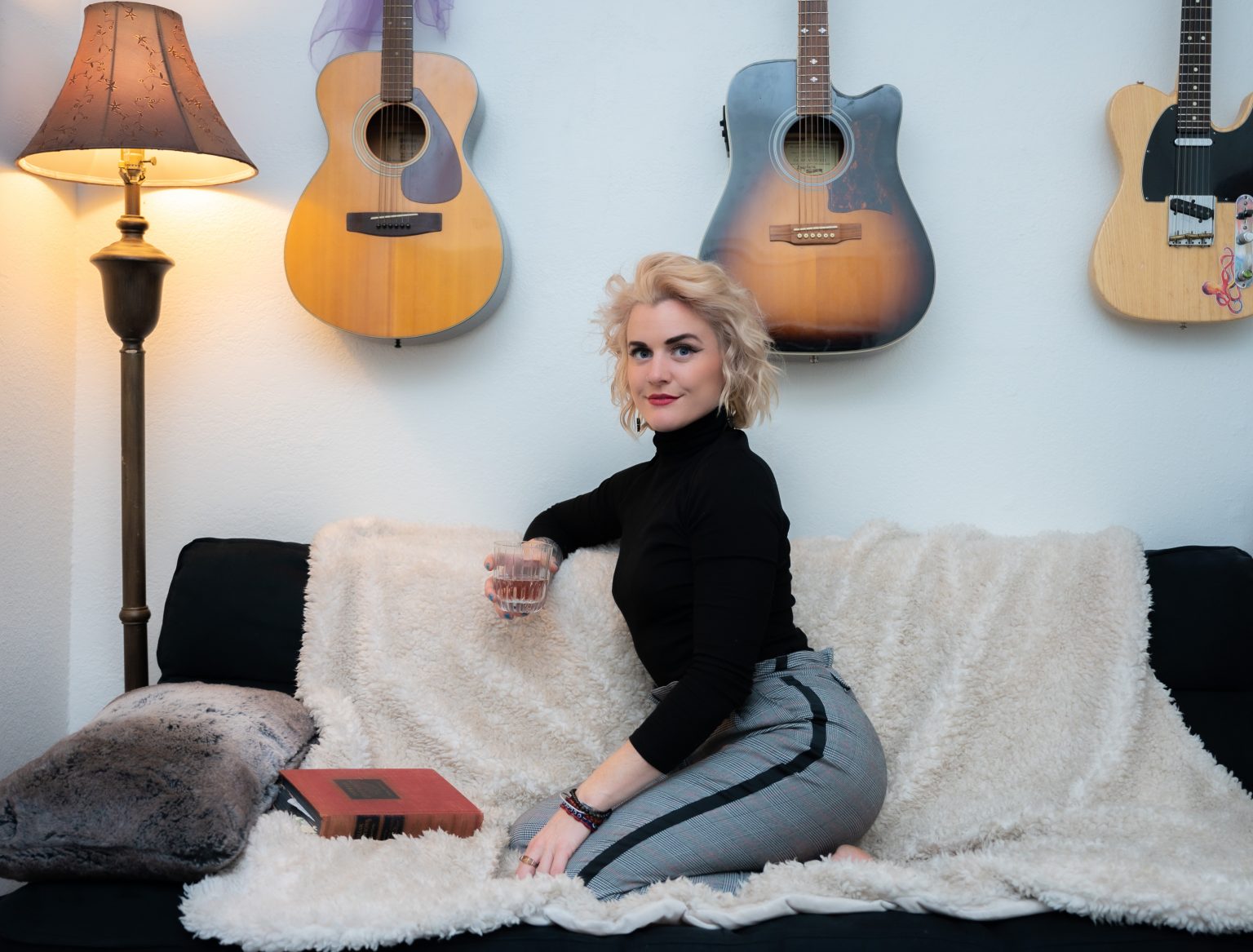
Hawkins has always been passionate about music—-she began with piano at a young age, progressed to guitar, and then to bass, eagerly exploring any instrument she could get her hands on. However, instead of following a traditional path of formalized lessons and structured music theory, Hawkins told the Blade that she “has a hard time following directions and being told what to do.”
This independent approach has led her to experiment with various genres and even join unexpected groups, such as a tribute band for Eric Clapton and Cream. While she acknowledges that her eclectic musical interests might be attributed to ADHD, she holds a different belief: “Creative minds like to move around.”
When discussing her latest musical release — “Stay True (the live album)” which was recorded in a live studio setting — Hawkins describes the experience as a form of improvisation with both herself and the band:
“[The experience] was this divine honey that was flowing through all of us.” She explains that this live album was uncertain in the music’s direction. “For a couple of songs,” Hawkins recalls, “we intuitively closed them out.” By embracing creative spontaneity and refusing to be constrained by fear of mistakes, the live album authentically captures raw sound, complete with background chatter, extended outros, and an extremely somber cover of Ozzy Osbourne’s “Crazy Train” coupled with a slow piano and accompanied strings.
While “Stay True” was a rewarding experience for Hawkins, her favorite live performance took place in an unexpected location—an unattended piano in the middle of an airport. As she began playing Beethoven’s “Moonlight Sonata”, Hawkins shared with the Blade a universal connection we all share with music: “This little girl was dancing as I was playing.”
After the performance, tears welled in Hawkins’ eyes as she was touched by the young girl’s appreciation of her musicianship. Hawkins tells the Blade, “It’s not about playing to an audience—it’s about finding your people.”
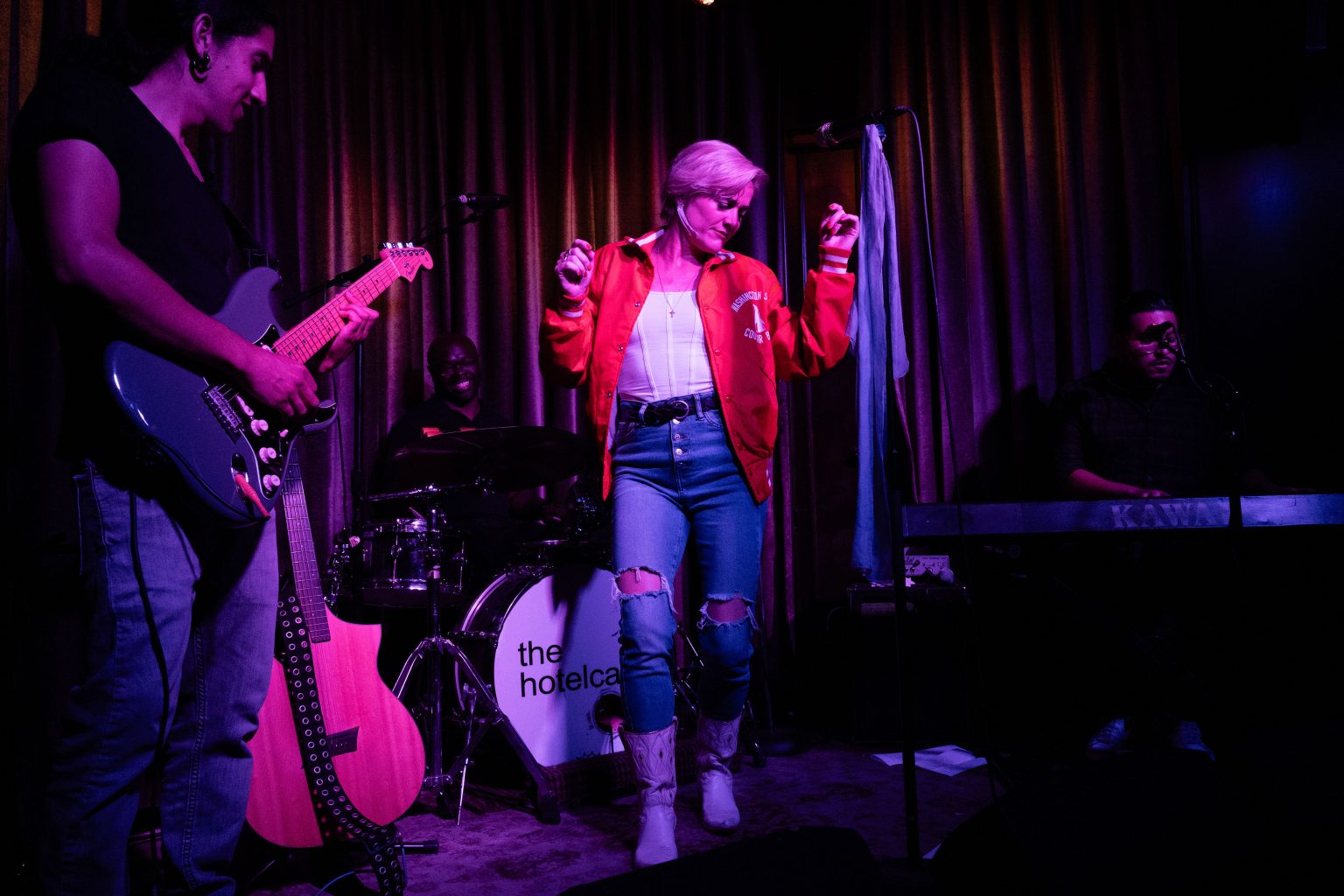
What sets Hawkins apart as an artist is her ability to connect with her audience in diverse settings. She highlights EDC, an electronic dance music festival, as a place where she unabashedly lets her “freak flag” fly and a place to connect with her people. Her affinity for electronic music not only fuels her original pop music creations, but also inspires her to reinterpret songs with an electronic twist. A prime example of this is with her electronic-style cover of Tal Bachman’s 90’s hit, “She’s So High.”
As an openly queer woman in the music industry, Hawkins is on a mission to safeguard artistic integrity. In songs like “My Father’s Men,” she bares her vulnerability and highlights the industry’s misogyny, which often marginalizes gender minorities in their pursuit of artistic expression.
She confides to the Blade, “The industry can be so sexist, misogynist, and oppressive,” and points out that “there are predators in the industry.” Yet, rather than succumbing to apathy, Hawkins is committed to advocating for gender minorities within the music industry.
“Luckily, people are rising up against misogyny, but it’s still there. ‘My Father’s Men’ is a message: It’s time for more people who aren’t just white straight men to have a say.”
Hawkins is also an activist for other causes, with a fervent belief in the preservation of bodily autonomy. Her self-directed music video “I’ll play Daddy,” showcases the joy of embracing one’s body with Hawkins being sensually touched by a plethora of hands. While the song, according to Hawkins, “fell upon deaf ears in the south,” it hasn’t stopped Hawkins from continuing to fight for the causes she believes in. In her interview, Hawkins encapsulated her political stance by quoting an artist she admires:
“To quote Pink, ‘I don’t care about your politics, I care about your kids.’”
When Hawkins isn’t writing music or being a champion for various causes, you might catch her doing the following: camping, rollerblading, painting, teaching music lessons, relaxing with Bernie (her beloved dog), stripping down for artsy photoshoots, or embarking on a quest to find the world’s best hollandaise sauce.
But at the end of the day, Hawkins sums up her main purpose: “To come together with like-minded people and create.”

Part of this ever-evolving, coming-of-age-like journey includes an important element: plant-based medicine. Hawkins tells the Blade that she acknowledges her previous experience with addiction and finds certain plants to be useful in her recovery:
“The recovery thing is tricky,” Hawkins explains, “I don’t use opiates—-no powders and no pills—but I am a fan of weed, and I think psilocybin can be helpful when used at the right time.” She emphasizes the role of psychedelics in guiding her towards her purpose. “Thanks for psychedelics, I have a reignited sense of purpose … Music came naturally to me as an outlet to heal.”
While she views the occasional dabbling of psychedelics as a spiritual practice, Hawkins also embraces other rituals, particularly those she performs before and during live shows. “I always carry two rocks with me: a labradorite and a tiger’s eye marble,” she explains.
-

 State Department2 days ago
State Department2 days agoState Department releases annual human rights report
-

 Maryland4 days ago
Maryland4 days agoJoe Vogel campaign holds ‘Big Gay Canvass Kickoff’
-

 Politics3 days ago
Politics3 days agoSmithsonian staff concerned about future of LGBTQ programming amid GOP scrutiny
-

 The White House1 day ago
The White House1 day agoWhite House debuts action plan targeting pollutants in drinking water

